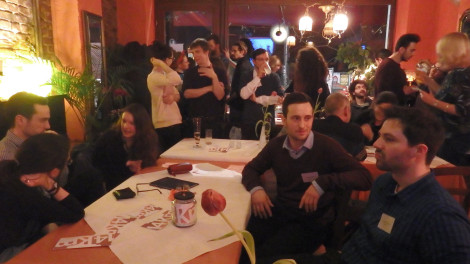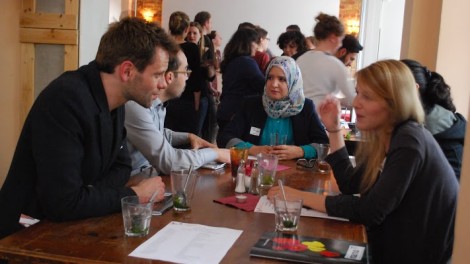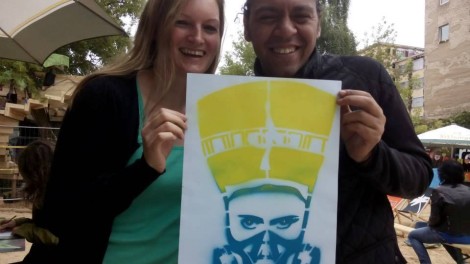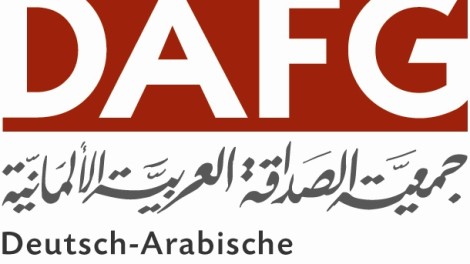14km Netzwerk @en
Full House at the Merhaba – Second MENA Network Event a Huge Success
For the second time the 14km team organised a network evening for experts and aficionados of the MENA region. This time it took place at the Restaurant Merhaba in Berlin Prenzlauer Berg. As in the year before the response was great - many interested people came to meet in a relaxed after-work atmosphere and to exchange and discuss ideas, plans and projects regarding the MENA region. On 19 March 2014, around 50 participants from NGOs/associations, academia, social initiatives, the media, administration as well as business and trade found together to chat, inspire and become inspired, discuss ideas and initiate cooperations, whether professional or voluntary. After a short welcome note by Andreas Fricke from 14km, who introduced the guests to some of the projects implemented by 14km in 2014, the participants proceeded to enjoy an evening full of interesting conversations, oriental specialties, photos from the 14km arquive, and atmospheric live music presented by the professional oud player Evren Can Kaman. Among the guests who had registered for the event were representatives of a broad range of different institutions, including for example the following but also quite a number of individual guests: Action Syria – Tamer Alawan & Friends e.V. Brot für die Welt Stiftung Wissenschaft und Politik Berliner Missionswerk BMW-Stiftung CRISP – Crisis Simulation for Peace e.V. Democracy Reporting International gGmbH DAFG – Deutsch-Arabische Freundschaftsgesellschaft e.V. Deutsche Welle Deutscher Akademischer Austauschdienst Eurient e.V. Freie Universität Berlin Ghorfa – Arab-German Chamber of Commerce and Industry e.V. Grüne Jugend Klaus Schwarz Verlag OMRAS – Organisation für Menschenrechte in den Arabischen Staaten e.V. Programmbüro Internationale Klimaschutzinitiative Schoolclash e.V. ZMO – Zentrum Moderner Orient Given that the interest in this year's MENA network event was even greater than the successful last time, it is just a matter of time until we will organise our next MENA network evening. We cordially thank everyone for coming and look forward to seeing you again! Organisation (14km): Andreas Fricke, Anja Gebel, Caroline Bunge, Evin Kücükali, Helena Burgrova, Houssein Ben Amor, Pauline Trueck, Premek Zboncak, Sama Younes und Steffen Benzler. Fotography (14km): Caroline Bunge
14km and closer – MENA Network Evening – Thursday 19 March 6.30pm
INVITATION 14km and closer – MENA Network Evening with Oud Live Performance On March 19 from 6.30pm onwards at Restaurant Merhaba Greifswalder Straße 4, Berlin-Prenzlauer Berg 14km e.V. invites you to an afterwork MENA network evening: in order to get to know other interesting people, exchange experiences and get creative. The event brings together different kinds of people who deal with the North African/Middle Eastern region (in main profession or as volunteers). In a relaxed environment you will have the opportunity to make contacts for your work in and with the region – accompanied by Evren Can Kaman and his oud. Since we would like to provide a network platform for people from many different fields of work, feel free to forward this invitation to other interested persons – for example from science, NGOs/associations, social initiatives, political foundations, media, arts and culture, politics and administration, and business. We look forward to an inspiring exchange! Participation is free, yet due to limited space please RSVP via email to steffen.benzler@14km.org. Tasty Oriental food and drinks can be purchased at the location. We look forward to welcoming you there! The 14km team
Stadtjugendring Stuttgart diskutiert Studie über Jugendmigration in Europa
Die innereuropäische und euro-mediterrane Jugendmigration nimmt seit Jahren zu, was Städte und Kommunen vor neuartige Herausforderungen stellt. Eine internationale Expertenkommission des Stadtjugendrings Stuttgart identifizierte in einer Studie Probleme und Lösungsansätze zur Migration von Jugendlichen in Europa, die vom 14. bis 16. November beim Abschlusstreffen des Jugendmigrationsrats in Stuttgart diskutiert wurde. Stuttgart gilt bei der Integration von Migrant/innen bundesweit als Vorbild. Der Stadtjugendring Stuttgart trägt mit dem Projekt Jugendmigrationsrat dazu bei, indem er Empfehlungen zur Migration von Jugendlichen für Akteure der internationalen Begegnung ausarbeitet. Als Diskussionsgrundlage wurde eine repräsentative Studie in vier Ländern durchgeführt, die eine Momentaufnahme der Jugendmigration in Europa darstellt. In fünfzig Interviews – 25 in Stuttgart, acht in Straßburg, acht in Ferrara, neun in ganz Spanien – mit Vertretern von Behörden, NGOs und Wohlfahrtsverbänden wurden anzugehende Probleme identifiziert. Die Ergebnisse der Studie wurden beim Abschlusstreffen des Projekts, an dem auch ein Vertreter von 14km teilnahm, diskutiert. Zwei Tage lang setzten sich die Expert/innen mit Fragestellungen, wie gegen die soziale Isolation von jungen Migrant/innen vorgegangen und wie der Zugang zu einer geregelten Arbeit erleichtert werden könne, auseinander. In der Studie wurde bewusst nicht zwischen Flüchtlingen und Nicht-Flüchtlingen unterschieden. Deshalb wurde der rapide Anstieg von Flüchtlingen¹ und unbegleiteten minderjährigen Flüchtlingen² in Stuttgart als ein Hauptproblem identifiziert.³ Es biete sich jedoch die Chance, die Diskrepanz zwischen den nordafrikanischen Staaten, in denen hochqualifizierte Jugendliche keine Arbeitsmöglichkeiten finden, und den europäischen Staaten, denen aus demographischen Gründen zukünftig ein Fachkräftemangel droht, als win-win-Situation zu nutzen – damit wäre das Thema Migration in ein positives gesellschaftliches Narrativ eingebettet. Insgesamt waren die Expert/innen sich einig, dass die in allen untersuchten Ländern festgestellte restriktive Asylpolitik, die unzureichende finanzielle Ausstattung der Akteure und die hohen bürokratischen Hürden in der Arbeit mit Migrant/innen überwunden werden sollten. Migrant/innen sollten die Möglichkeit auf eine geregelte Arbeit und Zugang zu genügend Informationen über das Aufnahmeland haben sowie mit Dolmetscherdiensten und Deutschunterricht sprachlich besser integriert werden. Diskutiert wurde die Wohnproblematik im Zusammenhang von Gentrifizierung, Migration und Stadtpolitik. Besonders umstritten war die Weiterverwendung des Begriffs einer zu schaffenden „Willkommenskultur“. Außerdem wurde der Wunsch geäußert, den bisher nicht verwendeten Begriff „Menschenwürde“ in die Endfassung der Studie einfließen zu lassen, da sie nicht von allen Akteuren der Jugendmigration in Europa respektiert werde. Die in der Studie nachgewiesenen europaweiten Kriminalisierungstendenzen von Migration wurden kritisiert. Als erfreuliche Erkenntnis erwies sich hingegen der hohe Vernetzungsgrad der Einrichtungen zur Jugendmigration. Zur Untermauerung der Studienergebnisse und für die Formulierung der konkreten Handlungsempfehlungen sollen in den verbleibenden Wochen best practices zu den einzelnen Empfehlungen gesammelt werden. Am letzten Tag des Treffens präsentierte zunächst das Internationale Jugendforum Beispiele für gelungene Projekte zur Integration von Migrant/innen, wie z.B. das Pilotprojekt get 2gether, das Migrant/innen in (Sport-)Vereine eingliedert, oder die marokkanische Association Moultaka des jeunes pour le Développement, die Migrant/innen in die arabische Sprache, den marokkanischen Dialekt sowie die Sitten und Bräuche Marokkos einführt. Im Anschluss wurde die strategische Kommunikation des Jugendmigrationsrats von den Expert/innen konzipiert. Bis April 2015 sollen die Studie und die Handlungsempfehlungen veröffentlicht werden. Projektskizze Bereits 2011 nahm sich der Stadtjugendring Stuttgart in weiser Voraussicht des Themas Jugendmigration an – als es weder in der öffentlichen Debatte noch in Politik oder Verwaltung eine große Rolle spielte. Gegen anfängliche Widerstände wurde das Projekt Jugendmigrationsrat ins Leben gerufen, das bis April 2015 Empfehlungen zum Umgang mit Jugendmigration für Akteure der internationalen Begegnung kreieren soll. Als Diskussionsgrundlage dienen das Expertenwissen im Jugendmigrationsrat, Dokumentationen, Medieninformationen, Erkenntnisse aus dem Jugendforum und die beim Abschlusstreffen besprochene Studie. Das Projekt wird von der Bundesagentur für Migration und Flüchtlinge und dem Europäischen Integrationsfond gefördert. --- ¹ Zahl der Flüchtlinge in Stuttgart: 9/2012 - 871 Flüchtlinge; 12/2013 - 1.584 Flüchtlinge; 12/2014 vorauss. - 2.800 Flüchtlinge; 2015 vorauss. - 4.000 Flüchtlinge. ² Zahl der unbegleiteten minderjährigen Flüchtlinge (UMF): 2012 - 90 UMF; 2013 - 111 UMF; 2014 - 248 UMF. ³ Quelle zu Flüchtlingszahlen: 34. Stuttgarter Flüchtlingsbericht Die Teilnehmer des Abschlusstreffens des Jugendmigrationsrats in Stuttgart
On an exchange visit to 14km – Ahmed Hassen from el Takeiba Center (Cairo)
From mid June to mid July 2014, Ahmed Hassen, the founder of El Takeiba Center for Artistic and Cultural Development in Cairo, Egypt, is visiting 14km in Berlin to work together on different projects and to share experiences - an exchange visit funded by the DAWRAK exchange programme of the Anna Lindh Foundation. The first cooperation between Ahmed and 14km consisted in a street art workshop for young people, teaching and discussing graffiti and its use as a tool of protesting, and giving a general background about the art of public wall painting and linking it to German history. Ahmed had a great time, showing a very creative attitude and - despite not speaking the same language - working side by side and in intense interaction with the young participants. El Takeiba Center is the first cultural center located in the poor Cairo area of Shoubra El Kheima. Ahmed, who is the director, intentionally opened it there, wanting to create a space that provides access to arts and culture for the inhabitants of the area who so far have been deprived of it. This is one of the main reasons for why it expanded quickly and is now well-known among the people of the district. The whole idea of founding this center came about due to a man called Rabea who was the guard of a famous art institute in Cairo. He loved poetry so much that someday he tried to get the chance to get into the institute and narrate a poem of his own to the audience. Yet he was banned because he was "just" the guard of the place. This incident had a deep impact on Ahmed, and he decided to help Rabea and everyone interested in art no matter what their social class, profession, education level, political views or even religious views are - everyone should have the chance to express themselves via arts and try out their talents. Ahmed believes in the power of art to change what words and arguments cannot. The El Takeiba Center has various projects and organises workshops for different groups of people according to their age, gender, and interests and covering different topics and different artistic methods, from acting, directing, improvising on stage, singing, comic drawing to caricature painting. The center also organises "cultural visits", where people from Shoubra El Kheima are invited to different cultural events elsewhere in the city. The only problem the center is facing is - as it often happens with small NGOs - the funding for these projects. Thus, Ahmed and his co-workers at El Takeiba invest a lot of their own money and time, yet they believe the difference they get to see in the people of Shoubra El Kheima is worth it, as they change for the better and discover their interest in learning more. Later this year, Anja Gebel from 14km will visit Ahmed in Egypt and work with the El Takeiba Center in Shoubra El Kheima.
Arab-German “Jour Fixe” for Young Academics – Workshop: Building an NGO
“Workshop: Building an NGO” on Monday, June 30th 2014 at 7:30pm, DAFG head office, Friedrichstr. 185 (Kontorhaus, House E, 7th Floor, Berlin) We cordially invite you to participate in the workshop "Building an NGO" at the 2nd meeting of the Arab-German "Jour Fixe" for Young Academics organised by the German-Arab Friendship Association (DAFG). Dr. Anja Gebel and Helena Burgrova of 14km e.V. will share their knowledge about how to build an NGO. Both speakers are committed to the non-profit NGO since its early days, having defined its strategy, built up organisational structures, and promoted the construction of an international network to help realise co-operations and equal partnerships between North Africa/the Middle East and Europe. They have also shaped the development of the NGO's main areas of work, such as the International Volunteer Programme that encourages the exchange between Europe and North Africa/the Middle East, and or the monthly Arab Film and Discussion Series. The workshop will give insights in defining an organisation's purpose and structure, project development and event organisation, volunteer recruitment, and PR work. But most importantly, we want to take time to brainstorm, share experiences, and to work on concrete NGO ideas together with the participants of the Jour Fixe. We would be happy to meet you at the event and have you share your thoughts and ideas with us. 14km's work is mainly based on voluntary work and new faces are always welcome! The Jour Fixe is open for English-speaking students of all disciplines and universities. The event will take place in English. It starts at 19:30 and ends with a joint "Iftar" (Muslim fast-breaking dinner after sunset during Ramadan). For registration please send an e-mail to DAFG e.V.: David Kordon Desk Officer Culture, Education and Science E-Mail: david.kordon@dafg.eu Phone: +49 (0)30 2064 94 13 Fax: +49 (0)30 2064 88 89 WorkshopFlyer download and share! Facebook-Group Report about the workshop





